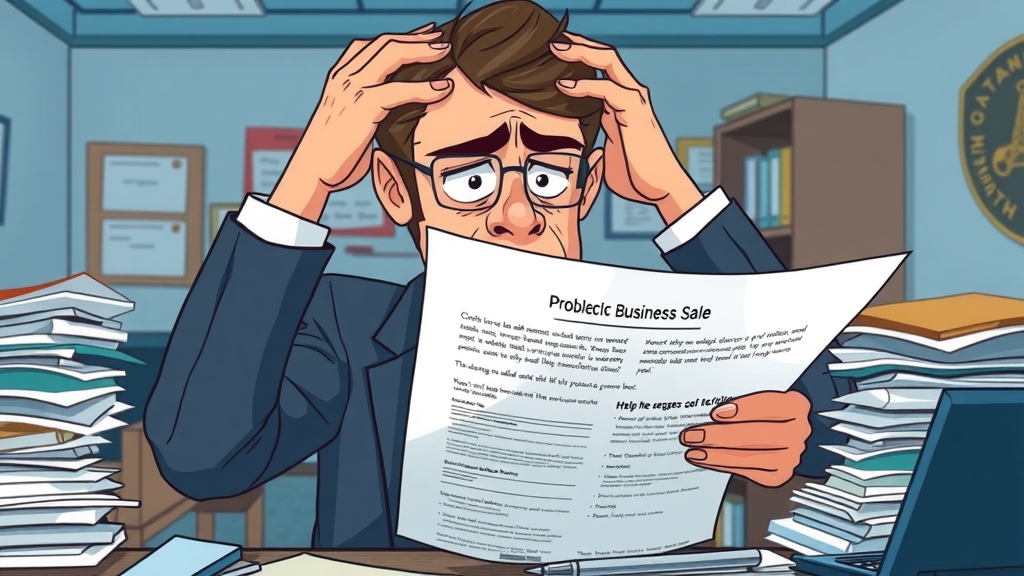Did you know that over 70% of small business owners admit to missing critical clauses in their first business sale agreement? Signing without fully understanding your contract risks serious financial loss, unexpected obligations, and even the collapse of the entire transaction. In this guide, you’ll uncover actionable strategies to review, negotiate, and finalize a business sale agreement that truly protects your interests. Don’t let your business dreams unravel—read on and take control of your sale!
- Here’s what you’ll gain: Clarity on business sale agreements, practical steps to review a purchase agreement, expert negotiation tips, and detailed guidance for a successful closing.

A Closer Look at Business Sale Agreements: Why Due Diligence is Essential
Understanding your business sale agreement is not just about reading the fine print; it’s about safeguarding your investment and your future. With over 70% of business owners admitting to missing key provisions, comprehensive due diligence is essential before you sign. Missing crucial details can result in unexpected liabilities, legal disputes with the other party, or even an uncompleted transfer of ownership.
Due diligence involves a painstaking review of every clause—examining the purchase price, asset lists, representations and warranties, indemnities, and the obligations of both buyers and sellers. Reviewing the business’s financial and legal documents, understanding tax impacts, ensuring compliance with regulatory requirements, and scrutinizing all terms and conditions are all integral parts of the process. Balance your trust with verification; what you overlook today may become a regrettable burden after closing.
Whether you’re buying or selling, treating your business sale agreement as a binding legal document ensures clarity, protects your interests, and lays the foundation for a smooth transfer of ownership. Skipping these steps exposes you to overlooked debts, unfunded pensions, or hidden litigation. Let’s explore the nuts and bolts of what makes a sale agreement air-tight.
- Did you know that over 70% of small business owners admit to missing critical clauses in their first business sale agreement? Avoid costly mistakes by understanding the essentials before signing.
What Is a Business Sale Agreement? Understanding the Legal Backbone of Your Deal
A business sale agreement is the cornerstone legal document that formalizes the transfer of ownership of a business from seller to buyer. It structures every facet of the transaction, from the purchase price and the description of tangible and intangible assets being transferred, to the obligations of both buyer and seller. At its core, the agreement not only outlines who gets what but also dictates the rules that ensure the transfer is legitimate, enforceable, and devoid of surprises.
Business owners often confuse a business sale agreement with a business purchase agreement , an asset purchase agreement , or even a straightforward bill of sale . However, each serves a distinct legal function, reflecting the complexity and stakes of selling a business compared to, say, selling office equipment or a single asset. The terms and definitions within these documents affect risk apportionment, tax implications, and ongoing liability—making precise language and clarity non-negotiable.
Essentially, a business sale agreement is your legal shield, protecting you from misrepresentations, breaches, and post-deal surprises for both the buyer and seller. Missing even one critical clause can unravel the entire transaction or expose parties involved to expensive litigation.
Business Sale, Purchase Agreement, and Sale Agreement: Definitions and Differences
- Business Sale Agreement vs. Business Purchase Agreement: Both terms are commonly used interchangeably. However, a business sale agreement is often implemented from the seller’s perspective, focusing on what’s being sold and the seller’s assurances. A business purchase agreement centers on the buyer’s acquisition and protections.
- Asset Purchase Agreement: Distinct from the above, an asset purchase agreement deals only with the transfer of selected business assets (like equipment, inventory, intellectual property, or real estate), whereas a business sale agreement can include liabilities and the full business entity.
- Distinguishing asset purchase agreements and business purchase agreements
“A business sale agreement isn’t just a handshake—it’s a protective shield for both buyer and seller.” – Attorney specializing in business purchases
Key Components: What Every Business Sale Agreement Must Include
To create a valid and enforceable business sale agreement , both parties must accurately specify what assets and liabilities are being transferred, the purchase price , and how the transaction will unfold. Failing to address any of these core elements can create loopholes, delays, or grounds for litigation. A robust business purchase agreement always details the consideration exchanged—be it cash, stock, or a combination—while laying out the closing date and contingencies.
On top of these essentials, the agreement should also meticulously outline asset lists (including tangible assets like inventory and equipment, and intangible assets like intellectual property), adjustments for property tax or liabilities, and the terms and conditions for transfer of ownership. Representations and warranties assure each side that disclosed information is accurate, while indemnities offer protection against unforeseen legal claims post-closing. Each word in the document carries legal significance, and both parties—buyer and seller—should be comfortable with every clause before signing.
Don’t overlook the need for precise language around the closing process. Requirements such as obtaining third-party consents, confirming licenses, and establishing escrow arrangements should be clear. These inclusions not only minimize risk but also facilitate a smoother closing date for your business sale .
Purchase Price, Assets, and Liabilities: The Heart of the Agreement
At the core of every business sale agreement is the detailed enumeration of the purchase price , the assets (and sometimes liabilities) being transferred, and the applicable terms for each. Clearly itemize every business asset and obligation being assumed or excluded; this prevents later disputes over inventory counts, intellectual property rights, or uncollected receivables. The agreement should also specify how the purchase price is paid—lump sum, installment, or contingent upon future performance (like earn-outs).
Equally important are details surrounding asset allocation for property tax and accounting purposes, which carry implications for both buyer and seller. Establishing clarity about which assets and liabilities remain with the seller—and which the buyer assumes—can prevent post-closing confusion. This section should also spell out exactly when ownership (and the risks and rewards that go with it) change hands.
If you are buying or selling real estate as part of the business, it is vital to have a special real estate section in your agreement, and it may require additional legal documentation. Remember, an effective business sale agreement must cover tangible and intangible assets comprehensively to avoid later surprises.
| Component | Purpose/Significance |
|---|---|
| Purchase Price | Defines total consideration being paid, payment structure, and adjustments. |
| Assets/Inventory | Outlines all physical and intangible assets to be transferred to the buyer. |
| Liabilities | Clarifies which debts, leases, or obligations the buyer will assume or leave behind. |
| Representations & Warranties | Formal statements by both parties confirming the truthfulness of disclosed information. |
| Indemnities | Protects parties from post-closing legal claims or losses related to past issues. |
| Closing Conditions | Specifies what must occur (such as financing or third-party approvals) to finalize the sale. |
- List of must-have clauses: purchase price, asset transfer, representations & warranties, indemnities, closing conditions

Purchase Agreement vs. Bill of Sale: Understanding the Distinctions
A purchase agreement serves as a binding document outlining the entire transaction: terms, assets, liabilities, and obligations of both buyer and seller. In contrast, a bill of sale is a straightforward record of the transfer of ownership for specific tangible assets (like equipment or vehicles). Think of the business purchase agreement as the architectural blueprint, and the bill of sale as the receipt that proves the actual handover of property.
You typically need a bill of sale when the business purchase includes significant tangible assets and you want to prove clear title or ownership transfer, such as for real estate, vehicles, or specialty equipment. The bill of sale is often attached as a closing document that supplements the larger purchase agreement. Failing to include a bill of sale when required can complicate the legal proof of asset ownership after closing.
- When do you need a bill of sale in business purchase agreements?
Drafting a Business Sale Agreement: Step-by-Step Guidance for Buyers and Sellers
Drafting a business sale agreement is a methodical process requiring a careful blend of legal expertise, business acumen, and clear communication between the parties involved. The process generally starts long before anyone touches pen to paper, often with preliminary negotiations and a letter of intent that lays out initial terms. Both the buyer and seller should approach the drafting stage with a clear understanding of their goals, non-negotiables, and desired outcomes for the sale agreement .
A strong drafting process typically unfolds in phases: open with a letter of intent (LOI) to define key deal points; negotiate specifics like the purchase price, assets, and closing date; then move toward a detailed business purchase agreement that incorporates findings from due diligence. Many sellers and buyers make the mistake of relying on generic templates or failing to update the agreement to reflect deal particulars—this almost always backfires with costly disputes.
Letter of Intent to Final Sale Agreement: Mapping the Transaction
A well-written letter of intent (LOI) starts the business sale process by outlining critical terms, including the proposed purchase price, payment terms, key assets, and major contingencies. While not always legally binding, the LOI sets the framework for detailed negotiations and lets both sides know where they stand on major deal points. This early agreement paves the way for a more comprehensive business purchase agreement and flags any red lines or deal breakers before investing significant resources in due diligence.
Moving from LOI to final sale agreement involves a clear set of steps. Parties review business documentation, conduct due diligence, negotiate finer points such as warranties and indemnities, and finalize closing dates. If issues arise during due diligence—such as undisclosed debts or inventory irregularities—these can be addressed, renegotiated, or may even halt the process. Having these steps mapped out in advance helps buyers and sellers keep sight of the end goal and manage potential roadblocks efficiently.
- How to use a letter of intent in a business sale agreement process
- Stepwise guide from negotiation to closing using business purchase agreements
Practical Tips: How to Write a Business Sale Agreement
- Checklist: Information required for a business sale agreement

When writing a business sale agreement , start by collecting all essential information: legal names and addresses of the parties involved, business details, a comprehensive list of all assets and liabilities being transferred, the agreed-upon purchase price, payment and financing terms, and any conditions precedent to closing. Clearly spell out what assets (including any real estate, equipment, inventory, customer lists, intellectual property, or contracts) are included and note anything being excluded.
Be explicit about representations and warranties made by each side, define the remedies available if any statement is later found false, and detail how disputes will be resolved. Always include closing mechanics (exact closing date , required documents like a bill of sale) and identify who pays which transaction costs or taxes. Remember, every business and every transaction is unique—never rely solely on generic templates.
“Never reuse a generic template without customizing for your unique purchase agreement needs.” – M&A Advisor
Legal Obligations and Risks in a Business Sale Agreement
A business sale agreement carries legal weight, setting forth the rights and responsibilities of all parties involved. Should conflict arise, courts will focus on what’s written in the agreement to determine recourse or damages. Compliance with all terms, proper execution, and full disclosure are necessary to make the contract legally binding and enforceable.
Risks include inadequate disclosures, misrepresentations, unfulfilled contingencies, or last-minute seller back-outs—each can lead to costly litigation or even reversal of the transaction. Both buyer and seller should recognize that breaching the agreement can result in penalties, lawsuits, and reputational harm. Protect yourself by knowing your obligations under the contract.
Rigorous attention to detail at the drafting stage, coupled with a comprehensive understanding of everyone’s duties, is the key to avoiding unintended pitfalls long after closing.
Is a Business Purchase Agreement Legally Binding? What You Need to Know
- Legal enforceability of business purchase agreement
A properly executed business purchase agreement is almost always legally binding . This means that, once both parties have signed and all legal formalities have been observed, the agreement can be enforced in court. Failing to comply with any of its provisions—even after closing—could subject you to claims for damages or even a lawsuit compelling “specific performance” (forcing the deal to complete).
Key elements for enforceability include clarity on material terms, mutual consent, proper signatures, and representations that are honest and accurate. Legal advice is essential at this stage; even one overlooked provision can give the non-breaching party grounds for legal recourse. Remember, a handshake has no legal force—a signed, written agreement does.
Seller and Buyer Responsibilities: Keeping Both Parties Accountable
- Buyer’s due diligence, seller’s disclosures, compliance with asset purchase requirements
Buyers are responsible for thoroughly examining all business documents—balance sheets, tax returns, customer contracts, intellectual property, and more—before finalizing the purchase agreement . Conducting meaningful due diligence minimizes the risk of post-closing surprises, such as undisclosed debts or regulatory infractions. The buyer’s role is to ensure that what’s promised matches reality and to raise concerns before closing.
Sellers have a duty to honestly disclose all material facts, including pending litigation, outstanding loans, compliance issues, and any challenges involving business assets. They must also help facilitate inspections and provide documentation needed for the buyer’s due diligence checklist. Failure to do so can result in post-sale liability or even the agreement’s rescission.
By clarifying all responsibilities and ensuring full transparency in the agreement, both parties protect themselves and the business from future disputes.
Negotiating the Best Terms in Your Business Sale Agreement
Mastering negotiation of your business sale agreement isn’t about winning at the table— it’s about understanding what each term means for your future. Well-negotiated terms (purchase price, warranties, indemnities, closing dates, non-compete agreements) determine not just the short-term success of the transaction but also your post-closing peace of mind.
Approach discussions with clarity on your “must-haves” and “deal breakers.” Common negotiation pitfalls include focusing only on the purchase price while missing hidden liabilities in asset purchase considerations or underestimating the significance of representations and warranties.
How to Approach Negotiations in a Business Sale and Purchase Agreement
- Tips for negotiating favorable purchase price, non-compete clauses, and warranties
- Common negotiation pitfalls to avoid in business purchase agreements

The best negotiation strategies focus on identifying what matters most: purchase price benchmarks, non-compete terms to safeguard business value, and solid representations and warranties to limit risk. Don’t shy away from seeking professional input on industry-standard clauses and referring to previous sales for context.
Avoid common mistakes, such as neglecting post-closing obligations, omitting earn-out mechanisms, or overlooking tax allocation in asset purchase agreements. Always get negotiated points in writing, and affirm that all parties involved fully understand their commitments. When in doubt, consult an attorney to clarify unfamiliar provisions.
“A negotiation isn’t won at the table—it’s won in the details of your business sale agreement.” – Renowned Commercial Lawyer
Common Mistakes in Business Sale Agreements and How to Avoid Them
Even seasoned entrepreneurs can fall into traps when finalizing a business sale agreement . Overlooked clauses—ranging from poorly defined tax allocations to vague earn-out provisions or inappropriate asset allocation for tax purposes—can have costly, long-term impacts.
Many sellers back out of agreements at the 11th hour, often due to unclear contingencies or shifting circumstances. Protect yourself by understanding the remedies outlined in your agreement: these may include return of deposits, damages, or specific performance.
Overlooked Clauses That Could Cost You Big
- Examples: tax allocation, earn-out provisions, inappropriate asset allocation in asset purchase agreements
Typical oversights include not specifying how purchase price is allocated among assets, which can create tax headaches for both sides; failing to define bonus or earn-out provisions clearly; or ignoring environmental or legal liabilities tied to property or licenses. Missing these details can expose buyers and sellers to unexpected costs, IRS scrutiny, or disputes over what was actually sold.
Take extra care to identify all assets (tangible and intangible), and don’t assume standard contract language will cover unique business circumstances—customization is key. Real estate, customer contracts, and IP rights should be addressed down to the last detail.
Seller Back-Outs and Buyer Protections in Purchase Agreements

A seller can only legally back out of a signed business purchase agreement under specific contractually agreed conditions—typically, if a financing contingency fails, or both parties mutually consent to terminate. Otherwise, a seller who pulls away post-signing can expose themselves to direct legal action, including orders to proceed with the sale (specific performance) or pay money damages.
Protect yourself as a buyer by adding remedies for breach: deposits refunded, damages for lost time, or even court-ordered completion of the sale. Engaging an attorney to structure these clauses is not optional—it's essential for your peace of mind.
- What happens if a seller backs out of a business purchase agreement?
Best Practices for Reviewing a Business Sale Agreement
A thorough review of your business sale agreement before signing is your first and last opportunity to avoid costly legal battles, compliance headaches, or operational disasters. Don’t tackle this solo: leverage the expertise of an experienced business attorney.
Best practices include comparing the draft agreement to your initial letter of intent, verifying that all representations and warranties align with facts, reviewing all schedules and attached exhibits, and confirming that no section contradicts your understanding of the deal. Scrutiny at this stage will save you far more than it costs, both in stress and dollars.
Engaging an Attorney for Business Purchase Agreement Review
- Why legal review of your sale agreement is vital

A qualified attorney provides more than just a second set of eyes—they interpret ambiguous clauses, negotiate changes, recommend additional protections, and flag state-specific compliance issues. Many deals go south because buyers or sellers skip legal review, trusting the other party or using one-size-fits-all templates found online.
Legal professionals ensure your business sale agreement is not just fair, but robust, enforceable, and suited to your unique needs. Their guidance may include rewriting sections for clarity, adding mandatory disclosures, and verifying that all material terms are properly addressed.
Due Diligence Checklist Before Signing a Business Sale Agreement
- Documentation, compliance checks, and financial review requirements
Your due diligence checklist should include: three full years of business financials, current asset and liability statements, tax returns, customer and vendor contracts, intellectual property assignments, employee records, pending litigation disclosures, real estate leases or titles, environmental audits (if applicable), and all compliance permits or licenses. Compare these documents with the proposed agreement to spot omissions early.
| Checklist Item | Purpose/What to Verify |
|---|---|
| Financial Statements | Confirm business profitability and identify unreported liabilities. |
| Tax Returns | Identify unpaid taxes, verify reported earnings, and flag discrepancies. |
| Key Contracts | Check assignability and renewability of supplier, client, or lease agreements. |
| Intellectual Property | Ensure proper title, registrations, and assignments for IP assets. |
| Employee Records | Verify wages, benefits, and potential employment disputes. |
| Legal and Tax Compliance | Confirm the business is up-to-date on all necessary filings and licenses. |
People Also Ask: Addressing Common Questions about Business Sale Agreements
How do I write a business sale agreement?
- To write a business sale agreement, clearly outline the sale terms, list all assets and liabilities, specify the purchase price, state both parties’ obligations, and attach supporting documents like a bill of sale and non-compete. Always consult legal counsel before finalizing.
A detailed business sale agreement should not only include the purchase price and asset list but also define closing dates, representations and warranties, indemnities, contingencies, and remedies for breach. Templates can help get started but require customization.
Can I write my own business purchase agreement?
- While it is legally possible to draft your own business purchase agreement, doing so without legal advice risks omissions of crucial protection clauses, potentially leading to disputes or unenforceable sections. Expert guidance is strongly advised.
Attempting to draft your own agreement increases the risk of missing hidden liabilities, non-compete loopholes, and unenforceable terms. Legal review is a must, especially for complex asset purchase or business sale transactions.
Is a business purchase agreement legally binding?
- A business purchase agreement is generally legally binding once signed by both parties, provided all legal requirements and disclosures are met. Any breach can lead to legal consequences or arbitration, depending on agreement terms.
As long as all required legal standards are met (clearly identified parties, mutual consent, well-defined material terms), the agreement binds both buyer and seller to perform as written.
Can a seller back out of a business purchase agreement?
- A seller can only back out of a business purchase agreement if certain conditions, such as contractual contingencies or mutual consent, are met. Otherwise, backing out can trigger legal remedies for the buyer, including seeking damages or specific performance.
After signing, a seller is only released if the agreement includes specific out clauses or if all parties agree. Otherwise, the buyer can sue for damages or to force completion of the deal.
Expert Insights: Quotes on Crafting a Reliable Business Sale Agreement
“Protecting your interests in a business sale starts and ends with a thorough purchase agreement.” – Leading M&A Attorney
Essential FAQs about Business Sale Agreements, Purchase Agreements, and Seller Obligations
- What is the difference between a purchase agreement and a sale agreement?
- What must be included for the business purchase agreement to be enforceable?
- How does an asset purchase agreement differ from a whole business sale?
The terms are often used interchangeably. In some contracts, a sale agreement refers to the seller's perspective and a purchase agreement from the buyer’s, but both govern the transfer of business ownership and lay out material terms and obligations.
It must specify the identities of buyer and seller, a clear description of all assets and liabilities, the purchase price, terms and conditions of sale, representations & warranties, closing conditions, and be duly signed with proper authority.
An asset purchase agreement only transfers selected assets and, sometimes, liabilities rather than the entire business entity. Whole business sales usually involve the transfer of shares or ownership interests and all associated risks and obligations.
Summary Table: Business Sale Agreement vs. Other Business Purchase Agreements
| Agreement Type | Main Use | Scope | Key Difference |
|---|---|---|---|
| Business Sale Agreement | Sale of entire business entity (assets, goodwill, liabilities) | Broad—can cover all or most assets, liabilities, and contracts | Transfers ownership and risk of the whole business |
| Asset Purchase Agreement | Sale of specific assets (equipment, IP, inventory) | Narrow—limited to listed assets/liabilities only | Selects specific assets/liabilities for transfer |
| Bill of Sale | Tangible asset transfer (e.g., vehicles, machinery) | Single items—acts as a receipt of transfer | Proof of individual asset ownership post-sale |
Action Steps: Secure Your Business Sale with a Thorough Agreement
- 1. Never sign a business sale agreement without a legal review.
- 2. Use this guide and checklist for your next business purchase or sale agreement.
- 3. Consult a specialized attorney for tailored business purchase agreements.
- 4. Protect your investment and ensure a successful transaction with a robust sale agreement.
Conclusion
Take control of your future—insist on a thorough business sale agreement, get professional advice, and use tailored checklists. Safeguard your ambitions and close your transaction with confidence.
Sources
- https://www.nolo.com/legal-encyclopedia/business-sale-agreements – Nolo.com
- https://www.bizbuysell.com/seller-tools/business-sale-agreement – BizBuySell.com
- https://www.findlaw.com/smallbusiness/business-contracts-forms/business-sale-purchase-agreement.html – FindLaw
- https://www.legalzoom.com/articles/business-purchase-agreements-everything-you-need-to-know – LegalZoom
 Add Row
Add Row  Add
Add 




Write A Comment